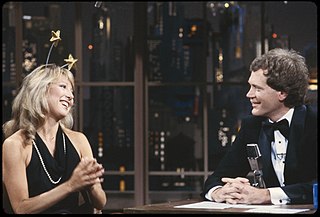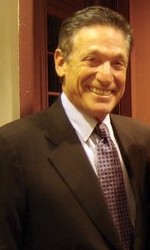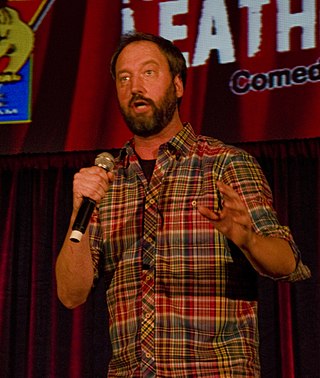Related Research Articles

A talk show is a television programming, radio programming or podcast genre structured around the act of spontaneous conversation. A talk show is distinguished from other television programs by certain common attributes. In a talk show, one person discusses various topics put forth by a talk show host. This discussion can be in the form of an interview or a simple conversation about important social, political or religious issues and events. The personality of the host shapes the tone and style of the show. A common feature or unwritten rule of talk shows is to be based on "fresh talk", which is talk that is spontaneous or has the appearance of spontaneity.

Late Show with David Letterman is an American late-night talk show hosted by David Letterman on CBS, the first iteration of the Late Show franchise. The show debuted on August 30, 1993, and was produced by Letterman's production company, Worldwide Pants, and CBS Television Studios. The show's music director and leader of the house band, the CBS Orchestra, was Paul Shaffer. The head writer was Matt Roberts and the announcer was originally Bill Wendell, then Alan Kalter. In most U.S. markets the show aired from 11:35 p.m. to 12:37 a.m. Eastern and Pacific Time, and recorded Monday to Wednesdays at 4:30 p.m., and Thursdays at 3:30 p.m. and 6:00 p.m. Eastern Time. The second Thursday episode usually aired on Friday of that week.

Late Night with Conan O'Brien is an American television talk show broadcast by NBC. The show is the second installment of the Late Night. Hosted by Conan O'Brien, it aired from September 13, 1993 to February 20, 2009, replacing Late Night with David Letterman and was replaced by Late Night with Jimmy Fallon. The show featured varied comedic material, celebrity interviews, and musical and comedy performances. Late Night aired weeknights at 12:37 am Eastern/11:37 pm Central and 12:37 am Mountain in the United States. From 1993 until 2000, Andy Richter served as O'Brien's sidekick; following his departure, O'Brien was the show's sole featured performer. The show's house musical act was The Max Weinberg 7 and led by E Street Band drummer Max Weinberg.

The Sifl and Olly Show is a comedy TV series that incorporates sock puppets, animation, and musical performances. Musicians Liam Lynch and Matt Crocco created and performed the series. The first episode aired on MTV in 1998. The show was cancelled in 1999. The characters, along with new material, currently appear on Liam Lynch's podcast entitled Lynchland.

Maurice Richard Povich is an American former television personality, best known for hosting the tabloid talk show Maury which aired from 1991 to 2022. Povich began his career as a radio reporter, initially at WWDC and later as host of a daytime Washington DC talk show Panorama. In the late 1980s, he gained national fame as the host of tabloid infotainment TV show A Current Affair, based at Fox's New York flagship station WNYW. In 1991 he co-produced his own show The Maury Povich Show, which in 1998 was rebranded as Maury.
I, Max was a sports commentary show featuring host Max Kellerman and Michael Holley that aired nightly on Fox Sports Net. The concept of the show involved Kellerman and his ego against the world, represented by Holley, broadcasting via satellite from Boston, with producer Bill Wolff, the former "Disembodied Voice" from Around the Horn, appearing live from NYC as the "impartial" mediator.

Rove, also titled Rove Live, is an Australian television variety show that featured live music performances and interviews with local and international celebrity guests. The program premiered on the Nine Network on 22 September 1999, before moving to Network Ten which aired the program from 2000 until November 2009. The show was hosted by comedian Rove McManus through his production company Roving Enterprises, and featured an ensemble cast who presented various segments throughout the course of the show. The show won the Logie Award for "Most Popular Light Entertainment Program" five times.

The Ellen DeGeneres Show is an American first-run syndicated talk show that was hosted by Ellen DeGeneres. The show ran for nineteen seasons from September 8, 2003, to May 26, 2022, in which it broadcast 3,339 episodes. It was produced by Telepictures Productions. The majority of stations owned by NBC Owned Television Stations, along with Hearst Television and Tegna, served as the program's largest affiliate base. For its first five seasons, the show was taped in Studio 11 at NBC Studios in Burbank, California. From season 6 onwards, the show moved to being taped at Stage 1 on the nearby Warner Bros. lot. Since the beginning of the sixth season, The Ellen DeGeneres Show was broadcast in high definition.

WWF Prime Time Wrestling was a professional wrestling television program that was produced by the World Wrestling Federation (WWF). It aired on the USA Network from January 1, 1985, to January 4, 1993. A precursor to Monday Night Raw, Prime Time Wrestling was a two-hour long, weekly program that featured stars of the World Wrestling Federation. The program featured wrestling matches, interviews, promos featuring WWF wrestlers, updates of current feuds and announcements of upcoming local and pay-per-view events. In addition, Prime Time Wrestling would also air wrestling matches and interviews from other WWF programming such as Superstars of Wrestling and Wrestling Challenge. Select episodes of Prime Time Wrestling are available for streaming on the WWE Network.

The Jenny Jones Show is an American first-run syndicated talk show that was hosted by Jenny Jones. The show ran for twelve seasons from September 16, 1991, to May 21, 2003, in which it broadcast over 2,000 episodes. Taped at the NBC Tower, the show premiered as a traditional talk show, with a focus on cooking, fashion, and celebrities. However, it reformatted into a tabloid talk show for its second season, where its focus shifted to single-issue panel discussions with everyday people. Guests discussed their personal experiences over a given topic, which often involved relational transgressions. These discussions were moderated by Jones, who placed a heavy emphasis on audience interaction. The show frequently featured music performances during makeover segments or at other breaks in the show.
A tabloid talk show is a subgenre of the talk show genre that emphasizes controversial and sensationalistic topical subject matter. The subgenre originated in the United States and achieved peak viewership from the mid-1980s through the end of the 1990s. Airing mostly during the day and distributed mostly through television syndication, tabloid talk shows originated in the 1960s and early 1970s with series hosted by Joe Pyne, Les Crane, and Phil Donahue; the format was popularized by personal confession-filled The Oprah Winfrey Show, which debuted nationally in 1986. The format has since been emulated outside the United States, with the United Kingdom, Latin America and the Philippines all having popular shows that fit the format.

SMAP×SMAP, often referred to simply as Sma-Sma, was a Japanese television variety show hosted by boy band SMAP. Debuting on April 15, 1996, it was produced by Kansai TV and Fuji TV and aired on Fuji TV every Monday from 10:00 p.m. to 10:54 p.m. (JST) until it ended on December 26, 2016.

Michael Thomas Green is a Canadian and American comedian, show host, actor, filmmaker, podcaster, and rapper. After pursuing stand-up comedy and music as a young adult, Green created and hosted The Tom Green Show, which aired on Canadian television and later on MTV between 1994 and 2000. The show became popular for its shock comedy, absurd pranks and Green's manic persona, and influenced later series such as Jackass and The Eric Andre Show. Green has also appeared in the Hollywood films Road Trip (2000), Charlie's Angels (2000), Stealing Harvard (2002), and Shred (2008). Green additionally directed, co-wrote and starred in the cult film Freddy Got Fingered (2001). He was briefly married to actress Drew Barrymore (2001–2002), who co-starred with him in Charlie's Angels and Freddy Got Fingered.

Gerald Norman Springer was an American broadcaster, journalist, actor, lawyer, and politician. He was best known for hosting the controversial tabloid talk show Jerry Springer from 1991 to 2018. Springer was noted as a pioneer in the emergence of "trash TV"; his eponymous show was a "commercial smash and certifiable cultural phenomenon" in the 1990s.
Joyce Davidson was a television personality in Canada and the United States.

The Rosie Show is an American evening television talk show starring and produced by Rosie O'Donnell that aired on OWN. The first episode premiered on October 10, 2011, on the stage that was formerly home to The Oprah Winfrey Show at Harpo Studios in Chicago. It was announced on March 6, 2012 that the show would be moving to New York in the near future. On March 16, 2012, OWN announced that The Rosie Show would be canceled after only one season and ninety-four episodes due to low ratings, with the final episode airing on Thursday March 29, 2012.
The following is a list of recurring Saturday Night Live characters and sketches introduced between September 27, 1997, and May 9, 1998, the twenty-third season of SNL.
Hacker Time is a British children's sketch comedy talk show, broadcast by CBBC, starring Hacker T Dog. In each episode, Hacker interviews a celebrity, and plays games and the show also includes recurring segments, such as sketches. Six series of the show were produced, which were aired from 2011 to 2016.

Tonite with HSY is a Pakistani prime time talk show hosted by Hassan Sheheryar Yasin (HSY) on Hum Sitaray. The show premiered on 13 September 2014. It is presented by Djuice and produced by Hum Television Network. Tonite with HSY represents the debut of its star, prominent fashion designer HSY, as a television host. Prior to the show, HSY had only made brief television appearances other than as a designer on fashion shows. The show's associate producers are Nida Lakhani and Sara Bhatti, of Hum TV, and its executive producers are Hum TV CEO Sultana Siddiqui and Hum Sitaray vice president Khalid Soorty. Tonite with HSY is recorded at Hum TV Studio in I.I Chundrigar Road, Karachi.
"Drew Live II" is the fifth episode of the sixth season of the American sitcom The Drew Carey Show, and the 132nd overall. It first aired on November 8, 2000, on the ABC network in the United States. The episode's plot sees Drew open an employment agency, but he has trouble finding jobs for his friends Lewis Kiniski and Oswald Lee Harvey.
References
- ↑ "GIVENS NEW HOST FOR 'FORGIVE'". The New York Daily News. 1999-11-30. Archived from the original on 2009-05-19. Retrieved 2009-04-15.
- ↑ "'Forgive Or Forget' TV Show Is Canceled". Jet. 2000-04-17. Retrieved 2009-04-15.